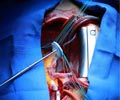The most common heart problems among the old people are those involving the mitral valve(that which controls the flow of blood between the two left chambers of the heart) and the aortic valve(that which controls the flow of blood into the heart). Until now, surgeons surgically replaced the damaged valve in these patients by opening the breast bone. However, a recent discovery of a new procedure, which does not involve surgery, could help patients who are too old or too sick to withstand the rigors of surgery.
The procedure, which is at a very early stage of research, will not be widely available for three to five years, but it is very promising and will open an entirely new area in the field of valve replacement. The technique, which was explained by Dr. Martin Leon, director of the Cardiovascular Research Center at Lenox Hill Hospital in New York City at the 15th Annual International Symposium on Endovascular Therapy in Miami Beach, has been performed just once on a 57-year old Frenchman. Clinical trials of the procedure are likely to begin in the next few months in Europe and later this year in the United States.The procedure uses a new type of replacement valve specially designed for the purpose. It is placed at the end of a flexible catheter that is inserted in the femoral vein in the groin and is guided to the diseased valve. It is put in place by inflating a balloon at the end of the catheter. The Frenchman on whom the technique was first used, had a badly damaged aortic valve and other medical problems that made surgery impossible. The man's condition showed considerable improvement after the procedure and he was able to resume some normal activities. However, he died four months later of complications that were not related to the procedure or to his heart condition. The procedure might prove to be competitive with surgical valve replacement in many circumstances if scientists can demonstrate that these valves are durable and the procedure can be done repeatedly, reliably and safely.
Dr. Barry T. Katzen, Medical Director of the Miami Cardiac and Vascular Institute and Chairman of the symposium concluded that such a procedure is imperative as doctors are seeing an increasing frequency of heart disease as the population is aging. He also added that the procedure if successful, will be used only in patients who have no other alternative and would die if it is not done, and hence would not replace conventional surgery. Dr. Katzen said that efforts are at present concentrated on using this technique for aortic valve replacement though it can be used for mitral valve replacement also.











